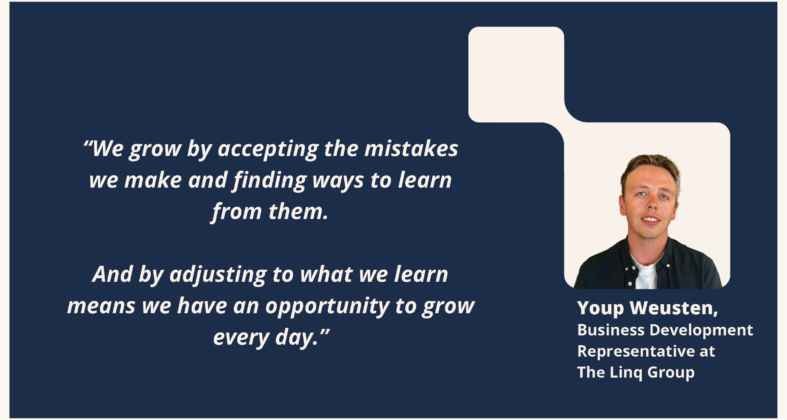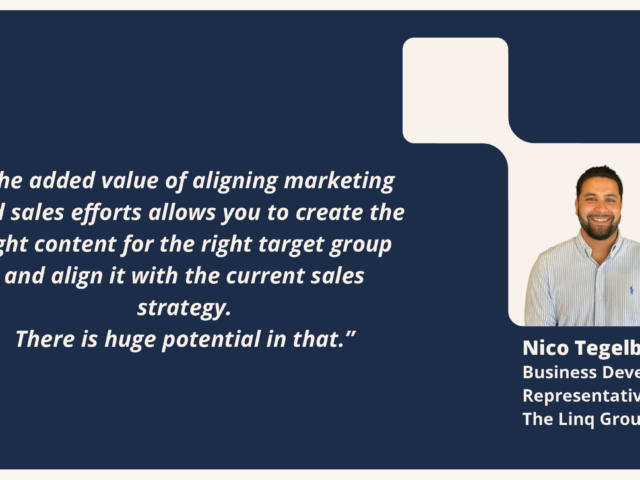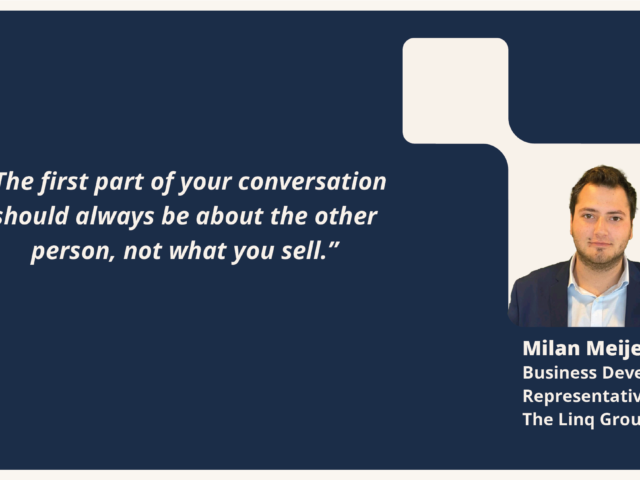Reflecting on Four Years in B2B Sales: What I Wish I Knew When I Got Started

I’m Youp Weusten, 25 years old working as a Business Development Representative for The Linq Group. My role as a BDR within our sales team is finding business opportunities for us, and I am also looking for the challenges sales teams in other companies are facing. I try to understand their current situation and needs and find out where and how we can help them. When I got into sales a few years ago, I quickly learned that sales is about asking the right questions and listening to what your prospects are saying. This sounds easy, but it is quite a challenge for many of us because it demands many of your soft skills like problem-solving and empathy.
We grow by accepting the mistakes we make and finding ways to learn from them. And by adjusting to what we learn means we have an opportunity to grow every day.
How I approach sales now compared to when I got started is quite different. The reason for this change lies both in my own personal development and the way our world has evolved. In the past, we talked about how we sell, but now we are beginning to focus on how customers buy. This is a major shift that requires a change in the way sellers interact with prospects.
Over the past four years, I’ve come to understand that sales is far more than just numbers and quotas; it’s about understanding people, empathizing with their challenges, and offering solutions that genuinely make a difference. In this post, I’ll be outlining the nuances of building long-term relationships, understanding prospect challenges, and the important lessons I learned from every conversation – good and bad.
Do the best you can do at that moment, and if it doesn’t go as planned, take it on the chin, learn from it, and move on.
Let’s dive in!
Table of contents:
- Building long-term relationships is the key to consistent growth
- How well you understand your prospect’s challenges determines the success of the B2B sales process
- One bad conversation does not dictate the course of your next interaction:
- Leave your ego at the door and learn to take criticism
- Summary: Sales is far more than just a numbers game
Building long-term relationships is the key to consistent growth

In the first meeting, for me, it’s always about laying down the foundation for a long-term relationship. Before every introductory meeting, I do my research and find something about the prospect I can personally connect with that I can use during the conversation.
For example, the other day, I was talking to someone who works in a building I used to work in a few years back. We started the call, made some small talk, and then I asked if the pool tables were still in the entry hall of that building because that’s where I often spent my lunch break back in the day. This was the easiest way to create a more relaxed environment before we even got to the sales part of the conversation.
To me, that’s also a fun part of sales because when you have these first meetings, it’s about all the small things that you can use to get someone to open up. And from then on, you can have the talk.
Another point I want to add, which requires quite a bit of practice, is matching someone’s energy. When you are selling, it’s important to match the energy of your customer or client. Being too high or too low in energy can make them feel uncomfortable. For example, if you are speaking too fast and they speak slowly, you need to adjust to their pace. The goal is to make the prospect feel at ease when talking with you. It’s often the soft skills like awareness and empathy that make the difference.
How well you understand your prospect’s challenges determines the success of the B2B sales process

This connects to my previous point: after you have started your call on a more personal note and created a relaxed environment, the real sales conversation starts.
During your first call with a lead, it’s not so much about what you are selling but the challenges they have and if you can offer them value. When you talk to a new prospect, you want to find out what exactly their problems are and if you, as a company, can be part of the solution.
How well you understand your prospect’s challenges will also determine the success of the next steps of your sales process. So, to make sure you get enough information during that initial call, do your research and prep a set of meaningful and open-ended questions that will give you a good understanding of your prospect’s situation and where they are in the buyer’s journey.
A good way to approach this is by making sure that the first part of your conversation is all about your prospect. Not what you sell. As my colleague Milan Meijer put it, “For the first 15 minutes, let your prospect talk. Listen carefully to what they are saying and understand where their pain points lie, what they need, and what their potential objections might be. This way, you will be able to tailor your pitch to their problem.”
One bad conversation does not dictate the course of your next interaction

“What’s important to remember is that, in sales, you are not just dealing with your own emotions but also the emotions of someone else.”
B2B sales can be tough, and there will be days when a prospect picks up the phone and won’t respond in a professional or friendly tone. But in these situations, it’s important to remember that bad days come and go. And one bad conversation doesn’t dictate the course of your next interaction. Even if you are going to talk to that same person again.
A good example was the call I made the other day. When I looked at my to-do list, I saw I had to call someone I talked to about four months ago, and I remembered that the prospect wasn’t very friendly. So, when I saw that, I was not necessarily looking forward to this conversation. But I called them anyway, and in the end, we actually had a really good talk and booked another meeting.
What I learned over the past years is that one bad day doesn’t mean tomorrow is going to be bad, too. And one difficult conversation with a prospect doesn’t mean the follow-up will go the same way.
Whenever you have a meeting, try to approach it with a positive mindset and not make any assumptions based on what happened before. Do the best you can do at that moment, and if it doesn’t go as planned, take it on the chin, learn from it, and move on.
Leave your ego at the door and learn to take criticism

When I got started in my career, I learned quite quickly that if you want to consistently get better in your role, you have to ask others for feedback. And one great way to do that is by sitting down with a teammate and listening back to your sales calls.
Recording and talking through your calls is probably already part of your training, but not every company uses these recordings consistently enough, especially after you are post-ramp time.
Yes, hearing yourself talk can feel awkward, and sometimes, you will cringe at something you said (or didn’t say.) But that’s alright, we’ve all been there. The important thing is to use these recordings as an opportunity to improve your sales strategy.
But before you sit down with your teammate to talk through specific points in your conversations, it’s important to prep concrete questions to get the most out of your feedback session.
Here are 6 specific questions you can ask that will help you improve your sales calls:
- If I could ask this question again, how could I rephrase it?
- Have you heard that objection before? How did you handle it?
- What is a discovery question I didn’t ask but should have?
- How would you have summarized this product feature to explain it more concisely?
- What do you think the other person was thinking when I said that?
- Could I have dug deeper here? If so, how would you have phrased your follow-up question?
Summary: Sales is far more than just a numbers game

Salespeople usually don’t have the best reputation. But from my experience, the most common misconceptions are far from the truth. Sales isn’t just a numbers game or pushing a product onto someone who doesn’t want to buy from you. B2B sales is about building long-term relationships with people, learning about the challenges they are struggling with, and finding ways to help them do their jobs better. A good sales process is prospect-centered and mutually beneficial.
Over the years, I learned that B2B sales is much more than just numbers and closed deals. Your success in sales heavily depends on your mindset, resilience, and willingness to learn.
To summarize my previous points, I would put it like this:
- The best salespeople are empathetic listeners and problem solvers. They take the time to understand their clients’ needs and engage in genuine, meaningful conversations.
- You don’t have to be a ‘born salesman’ to become successful. The most successful salespeople I have met are those who show resilience when they face rejection and willingness to learn when they fail. These qualities, combined with proper training and mentorship, can put you way ahead of the game.
- Sales teaches you skills that will benefit you for the rest of your career. You learn how to become a problem-solver, a good communicator, how to negotiate efficiently, and build relationships. All skills that make you more successful in your role but also as a team member and colleague.
Are you interested in having a chat with me about B2B Sales? Or how me and my team can help you generate more qualified leads through a prospect-centered, social selling approach? Send me a message or book a call here.📞Looking forward to talking with you about how we can work together to achieve your business goals!












